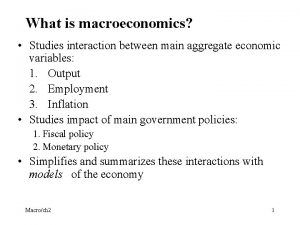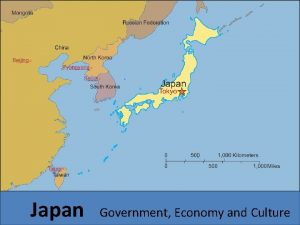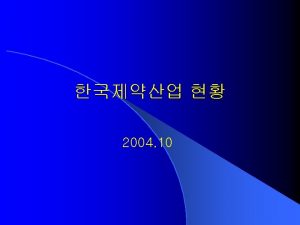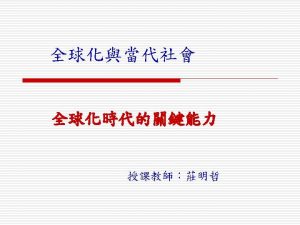Economy of Japan Japans GDP The economy of





- Slides: 5

Economy of Japan

Japan's GDP • The economy of Japan is the third-largest in the world by nominal GDP and the fourth-largest by purchasing power parity(PPP). and is the world's second largest developed economy. According to the International Monetary Fund, the country's per capita GDP (PPP) was at $37, 519, the 28 th highest in 2014, down from the 22 nd position in 2012. Japan is a member of the G 7. The Japanese economy is forecasted by the Quarterly Tankan survey of business sentimentconducted by the Bank of Japan. Nikkei 225 presents the monthly report of top Blue chip (stock market) equities on Japan Exchange Group. Due to a volatile currency exchange rate, Japan's GDP as measured in dollars fluctuates widely. Accounting for these fluctuations through use of the Atlas method, Japan is estimated to have a GDP per capita of around $38, 490.

Japan's development • Japan is the world's third largest automobile manufacturing country, has the largest electronics goods industry, and is often ranked among the world's most innovative countries leading several measures of global patent filings. Facing increasing competition from China and South Korea, manufacturing in Japan today now focuses primarily on high -tech and precision goods, such as optical instruments, hybrid vehicles, and robotics. Besides the Kantō region, the Kansai region is one of the leading industrial clusters and manufacturing centers for the Japanese economy.

Overview of economy In the three decades of economic development following 1960, Japan ignored defense spending in favor of economic growth, thus allowing for a rapid economic growth referred to as the Japanese post-war economic miracle. By the guidance of Ministry of Economy, Trade and Industry, with average growth rates of 10% in the 1960 s, 5% in the 1970 s, and 4% in the 1980 s, Japan was able to establish and maintain itself as the world's second largest economy from 1978 until 2010, when it was surpassed by the People's Republic of China. By 1990, income per capita in Japan equalled or surpassed that in most countries in the West.

Asian markets • The ICT industry has generated the major outputs to the Japanese economy. Japan is the second largest music market in the world (for more, see Japan Hot 100). Manga cafe business expands to 2000 stores nationwide in Japan in 2002. With fewer children in the aging Japan, Japanese anime industry is facing growing Chinese competition in the targeted Chinese market. [60] Japanese manga industry (from the Japanese manga (and anime) profession) enjoys popularity in most of the Asian markets. Local gourmets of 47 Prefectures of Japan are guided and promoted by Ministry of Agriculture, Forestry and Fisheries (Japan). Japan Cup in the Tokyo Racecourse is one of the richest horse racing in the world.









